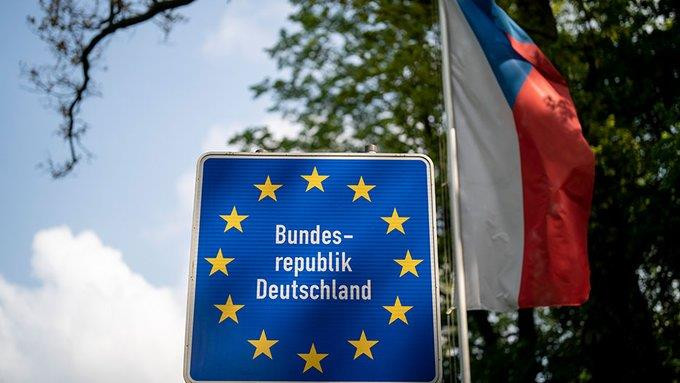Germany has taken a dramatic step, reintroducing border checks at all its land borders as part of a crackdown on migration, a move that has placed restrictions on the vast area of free movement known as the Schengen Zone and sparked anger among its European neighbors. From Monday, September 16, in addition to existing border controls with Austria, Switzerland, the Czech Republic, and Poland, Germany will now also have internal border controls with France, Luxembourg, the Netherlands, Belgium, and Denmark. The German government will have the power to reject people at all land borders. These new rules will last for six months initially.
This move signifies a significant shift in Germany's stance on the complex issue of migration. During the migrant crisis of 2015-2016, Germany under Angela Merkel welcomed over one million new arrivals. However, in recent years, Germany, like many other European countries, has been tightening its rules as it faces a surging far-right opposition. This decision comes just days after Germany reached a controlled migration agreement with Kenya, which will see Berlin open its doors to skilled and semi-skilled Kenyan workers.
Announcing the changes, Interior Minister Nancy Faeser emphasized that Germany is “strengthening internal security through concrete action” and continuing its “tough stance against irregular migration.” Faeser's statements suggest the move is aimed at safeguarding German citizens from the dangers posed by Islamist terrorism and serious cross-border crime. However, this move has tested the unity of the European bloc and drawn criticism from Germany’s neighbors.
Germany is part of the Schengen border-free area, where the free movement of people between member states is a cornerstone principle. Under European Union rules, member states have the ability to temporarily reintroduce border control at internal borders in the event of a serious threat to public policy or internal security. However, this must be applied as a last resort.
The move has been met with strong opposition. Poland’s Prime Minister Donald Tusk voiced his displeasure, stating that the introduction of tighter controls at land borders was “unacceptable” for Poland. Tusk also added that Warsaw would request urgent talks with all affected countries. Both Greece and Austria have warned that they would not accept migrants rejected by Germany. Closer to home, Germany’s Council for Migration has warned that the plan risks violating EU law. “The current policy goal of turning back (migrants) seeking protection at Germany’s borders represents a dangerous form of populism in the migration policy debate,” a statement from the Council read. The statement also called for an “evidence-based debate on migration policy in Europe.”
Germany's government, led by Chancellor Olaf Scholz, has faced criticism for not taking sufficient action to tackle uncontrolled immigration. The country's approach to migration has hardened in recent years, driven by a surge in arrivals, particularly from the Middle East and Ukraine, as well as terror attacks motivated by Islamic extremism. The coalition government is seeking to counter the rise of the country’s burgeoning far-right Alternative for Germany (AfD), which is known for its explicitly anti-immigrant and anti-Islam agenda.
The new security package came in the wake of a fatal attack in the western city of Solingen, where three people were stabbed to death on August 23. The suspect, a 26-year-old Syrian man with alleged links to ISIS, had previously been due for deportation.
These new measures have been widely criticized. Some have argued that the new restrictions are a response to extremism-related knife attacks committed by migrants in Germany in recent months. Others see it as an effort to appease the growing anti-Middle Eastern migrant sentiment in Germany, which has contributed to historic far-right victories in local elections.
Polish Prime Minister Donald Tusk has labeled the border restrictions “unacceptable.” Agnieszka Łada-Konefał, deputy director of the German Institute of Polish Affairs, criticized the move as hypocritical, considering Germany’s proclaimed openness to migrants in recent years, ultimately pushing migrants back to Poland. “Due to the negative perception of the influx of migrants in Poland, any report of migrants being returned by Germany also negatively affects Polish-German relations and Germany’s image in Poland,” Łada-Konefał told AP News.
Svenja Niederfranke, a migration specialist at the German Council on Foreign Relations, told Euronews that the additional screenings would place immense strains on available law enforcement personnel and resources, with a police union demanding 5,000 more postings to be created for the task. “The cost is, of course, very costly to put in the infrastructure to deploy these police officers,” Niederfranke said.
Germany’s Council for Migration has also criticized the move for potentially violating EU laws. “The current policy goal of turning back (migrants) seeking protection at Germany’s borders represents a dangerous form of populism in the migration policy debate,” the Council said, as reported by CNN.
CNN also reported that EU member states such as Germany can legally reintroduce temporary border control at internal borders in the event of a serious threat to public policy or internal security. However, the restrictions must be applied as a last resort.
The specter of disunity within the EU on migrant issues looms large as Berlin seemingly backtracks on its proclaimed openness to migrants, a policy it championed in recent years. “The controls could test European unity if they lead to German authorities requesting other countries to take back substantial numbers of asylum seekers and migrants,” Reuters reported.

















